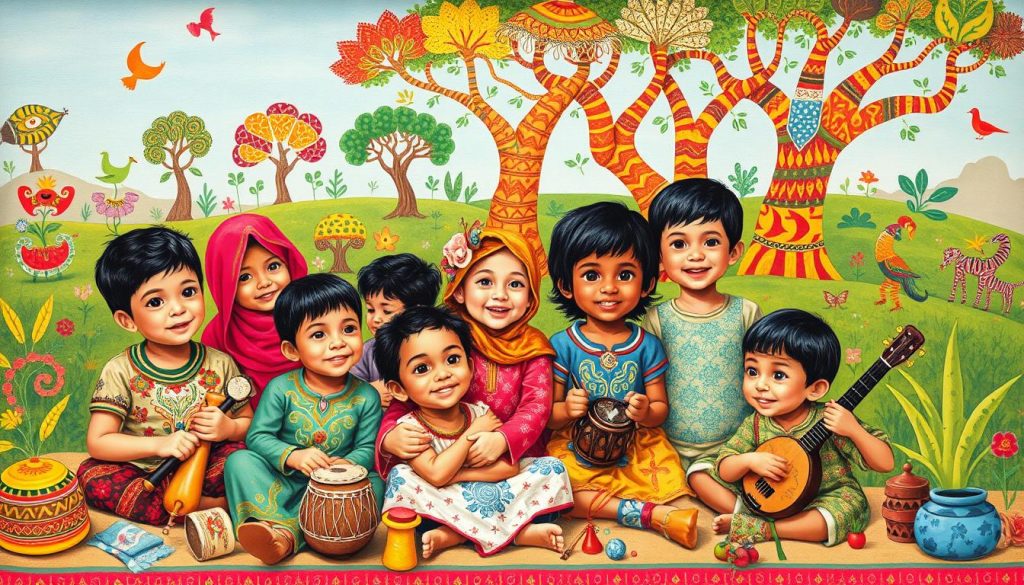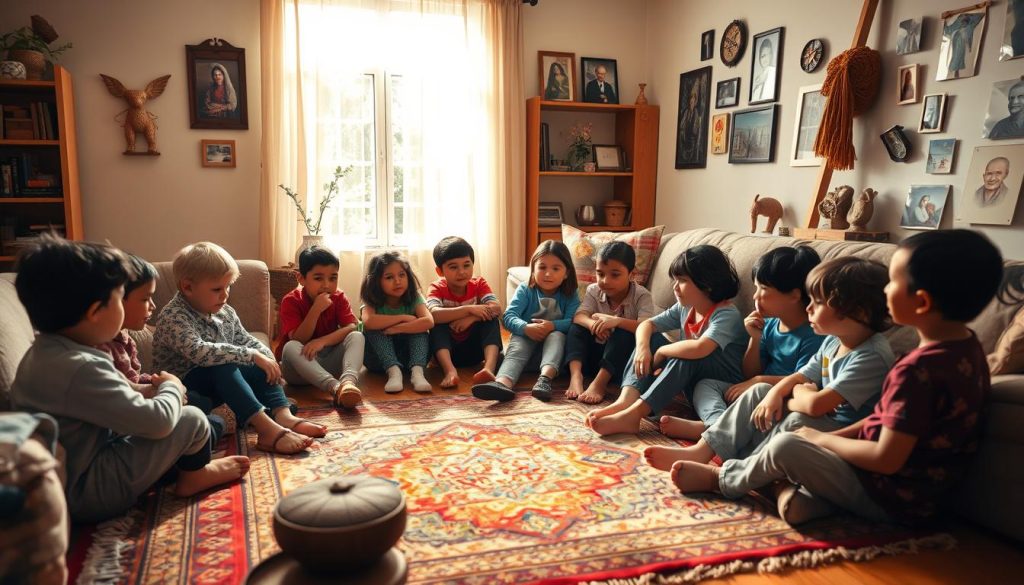Welcoming diversity in foster and adoptive parenting boosts kids’ growth and happiness. With 430,000 kids in foster care in the U.S. as of 2019, it’s key to be culturally aware. Dairius Kawewehi, a former foster youth, shares his journey through different cultures.
Supporting your foster child’s cultural identity makes them feel at home. It also boosts their self-esteem and emotional health. Studies show that keeping cultural ties is linked to feeling part of a community and having a positive identity.
Being genuine and open to your foster child’s culture can change their life. Add cultural traditions to your daily life to make your home welcoming. By tackling cultural alienation early, you create a caring space for your child.
Key Takeaways
- Embrace diversity in foster and adoptive parenting for better child development and well-being.
- Support your foster child’s cultural identity to foster their self-esteem and emotional health.
- Implement cultural traditions into daily routines to create a respectful home.
- Proactively address cultural alienation to nurture inclusivity.
- Cultural competence training enhances foster parents’ ability to support children from diverse backgrounds.
Understanding the Importance of Identity in Foster Care
Foster care disrupts a child’s life, making identity formation tough. The effects of family separation are deep, affecting all parts of a child’s growth. Kinship care, like living with relatives, is beneficial. It offers five key advantages: it reduces trauma, keeps cultural identity, boosts stability, improves behavior, and strengthens sibling bonds.
What is Identity Formation?
Identity formation in kids mixes personal experiences, culture, and environment. For foster kids, this process is complicated. Studies show foster kids face developmental delays, behavior issues, and mental health problems.
The Role of Culture in Identity
Culture shapes a child’s identity. Foster parents must understand and support a child’s cultural background. Black families, for example, are overrepresented in foster care. Keeping cultural ties helps foster kids feel connected and boosts their self-esteem.

Challenges Faced by Foster Children
Foster kids face many challenges. The emotional impact of foster care includes feelings of loss and isolation. The CDC says providing health services requires understanding and valuing cultural beliefs. This helps foster kids build a positive identity.
Research shows foster kids do better when they feel culturally connected. In NYC, 76% of kids were placed in culturally compatible homes in 1999. Meeting cultural needs in foster care respects the child and invests in their future.
| Key Principle | Details and Findings |
|---|---|
| Minimizing Trauma | Placing children in kinship care helps reduce the immediate trauma of separation. |
| Cultural Identity | Preserving and celebrating a child’s culture is crucial for their identity formation. |
| Stability | Stable placements lead to better mental and emotional health outcomes. |
| Behavioral Outcomes | Stable and culturally compatible homes lead to improved behavioral regulation and fewer conduct issues. |
| Sibling Ties | Maintaining sibling connections helps in emotional and psychological support. |
Embracing Your Foster Child’s Cultural Background
When you welcome foster children into your home, it’s key to respect their cultural roots. This act can boost their sense of identity and belonging. In 2020, about 437,500 kids were in foster care in the U.S., showing how vital cultural sensitivity is.

Researching Their Cultural Heritage
Start by diving deep into your foster child’s cultural identity. Learning about their traditions and heritage is crucial. Read books, attend cultural events, and use community resources to understand their background.
Knowing their history, values, and practices helps you create a caring home environment.
Incorporating Cultural Traditions in Daily Life
Bringing cultural traditions into your daily routine is a great way to honor your child’s heritage. Try adding traditional foods to your meals and celebrate cultural milestones. Learning their native language or phrases is also a thoughtful gesture.
These actions can make your foster child feel more at home and valued. Foster parents’ empathy and understanding are key to a child’s emotional and psychological growth, strengthening family bonds.
Celebrating Cultural Holidays Together
Celebrating cultural holidays is essential to keep a child connected to their roots. Join festivals, observe traditional ceremonies, and participate in community celebrations. This support can greatly improve your foster child’s well-being.
It also helps foster parents deal with the 56% chance of facing challenges in accommodating the foster child’s birth family’s religious beliefs.
Here are some steps to effectively embrace your foster child’s cultural background:
| Action | Description |
|---|---|
| Research Cultural Heritage | Engage with books, community resources, and cultural events to learn about your foster child’s background. |
| Include Cultural Traditions | Incorporate traditional foods, languages, and daily practices to respect your child’s culture. |
| Celebrate Cultural Holidays | Participate in festivals and ceremonies to honor and celebrate your child’s heritage. |
Welcoming foster children into your family is more than just providing a home. It’s about creating a caring and culturally sensitive space. By valuing your foster child’s cultural background, you help them build a strong and positive identity.
Building Strong Communication Channels
Good communication is key to helping foster children feel safe and loved. It builds trust and makes them feel part of the family. We’ll look at ways to improve talking, listening, and handling tough subjects.

Encouraging Open Dialogue
Open talk makes foster kids feel important and heard. Even though 73% of them say their opinions matter, a quarter still feel ignored. By discussing adoption with children and asking for their thoughts, you show them they count.
Active Listening Techniques
Listening well means more than just hearing words. It’s about catching the feelings and meanings behind them. Social workers suggest using empathy and paying attention to body language for better talks. For example, really listening to a child’s worries about open adoption challenges can make your bond stronger.
Addressing Sensitive Topics
Talking about tough subjects like adoption needs care and understanding. When discussing adoption with children, make sure they feel safe to share their feelings. Being open and honest helps them deal with these big emotions.
Good communication makes life better for foster kids and their caregivers. It builds trust, improves feelings, and creates a place where kids feel valued and respected.
Creating a Supportive Environment
Creating safe and supportive foster environments is key to fostering inclusivity. It ensures the well-being of foster children. A supportive environment helps them emotionally and psychologically, leading them to a positive path.
Importance of Safe Spaces
Foster children come from different backgrounds and may have faced trauma. It’s vital to create safe spaces for them. These spaces should be places where they feel secure and respected.
Having clear rules against physical punishment and confinement is important. It helps create a safe and respectful environment. Respecting their personal space and privacy is also crucial for their emotional well-being.
Affirmation and Encouragement
Recognizing and celebrating foster children’s achievements boosts their self-worth. Positive reinforcement and non-punitive discipline methods make them feel valued. This approach helps build trust and inclusivity in the household.
Consistent encouragement and affirmations help them overcome past traumas. It gives them a sense of belonging and security.
Involvement in Community Activities
Involving foster children in community activities enhances inclusivity. It helps them understand different cultures and develop socially. Social connections are vital for their emotional and psychological health.
These activities build trust and foster a supportive environment. It’s important to offer opportunities that match their interests and celebrate their cultural heritage.
| Key Factors | Importance |
|---|---|
| Safe Spaces | Critical for emotional and physical well-being |
| Affirmation and Encouragement | Builds self-worth and happiness |
| Community Involvement | Enhances social and cultural understanding |
| Respecting Personal Space | Essential for trust and emotional safety |
Educating Yourself and Your Family
Learning is key for families in foster care. It helps you understand your role better and use good parenting methods. This part talks about ways to improve your skills as a foster parent. It also helps create a caring space that values and celebrates different cultures.
Attending Workshops and Seminars
Workshops and seminars are great for learning from experts and meeting other foster parents. They cover the complex tasks of foster care, including understanding identity and culture. Many top adoption agencies have training that focuses on these important topics.
Reading Relevant Literature
Reading books and articles on fostering is also helpful. They offer practical tips and deep insights into the challenges of foster care. For example, learning about the emotional effects of fostering helps you deal with kids’ behavior and support them emotionally.
Engaging with Cultural Advocacy Groups
Joining cultural advocacy groups lets you dive into the backgrounds of the kids you care for. These groups host events and provide resources that celebrate diversity. Many top adoption agencies work with these groups, making it easier to find these valuable resources.
Learning is crucial, as it takes six to twelve months to become a foster parent. About 50% of foster parents stop within a year, showing the need for ongoing support and education. By keeping up with learning and using the right resources, you can make a big difference in the lives of the children you care for.
Fostering Relationships with Birth Families
Building relationships with birth families in foster care can be both rewarding and challenging. It’s important to understand the benefits and complexities involved. This includes finding birth parents and facing open adoption challenges. We will explore how to maintain connections, handle visits and communication, and set boundaries.
The Benefits of Maintaining Connections
Keeping connections between foster children and their birth families offers many benefits. It helps children feel a sense of continuity and identity. In Pennsylvania, the average time a child spends in foster care is 20 months. This makes maintaining connections crucial for their emotional well-being.
Such connections can provide stability and help children understand their personal history. Positive communication about the child’s welfare and progress is key. It shows that everyone involved cares about the child’s best interests.
Navigating Visits and Communication
Visits and communication with birth families require careful planning. Scheduled, supervised, and court-ordered visitations are common. It’s important to create a safe and positive environment during these interactions.
When dealing with open adoption challenges, focus on respectful behavior towards birth parents. Avoid negative discussions. Constructive interactions with caseworkers and lawyers are also important. Sharing photos or crafts made by the children can help foster comfort and avoid personal questions.
Engage in pleasant small talk to ease any tension. This can make interactions more comfortable for everyone involved.
Setting Boundaries and Expectations
Setting clear boundaries and expectations is vital for the well-being of foster children and maintaining healthy relationships with birth families. Differences in parenting styles can cause tension. It’s important to navigate these differences with empathy.
Setting guidelines before visitations can ensure a smooth interaction. Being respectful and concise during court appearances is recommended. This helps avoid overstaying and creating awkward situations. Maintain safe information-sharing practices and keep comments positive about birth parents around foster children.
Modeling positive relationships can have a big impact on the children’s development. It shows them what healthy relationships look like.
Encouraging Your Foster Child’s Interests and Passions
Helping your foster child grow means supporting their interests and passions. Activities they love can boost their self-esteem and help them feel good about who they are. Watch how they act, talk, and react to find out what they’re good at.
Give them the support and resources they need to explore and grow these talents. This is crucial for their happiness and success.
Identifying Their Unique Talents
Pay attention to how your foster child spends their free time. Notice what they naturally enjoy doing. Talking to them about their likes and dislikes can also show you what they’re passionate about.
Let them try different activities and hobbies. Dr. Karyn Purvis says saying “yes” seven times for every “no” builds trust. This is key in helping them find their talents. Make sure they feel safe and valued as they discover their unique skills.
Enabling Participation in Cultural Activities
Being part of cultural activities is important for older child adoption. These activities help them understand and connect with their culture. They also make them feel like they belong.
Make sure to include their cultural background in your daily life. This could be through music, dance, crafts, or community events. Joining in shows you care and helps build a strong bond. This way, cultural activities become a shared experience that empowers them.
Supporting Education and Extracurriculars
Education and extracurricular activities are key for a foster child’s growth. Activities like sports, arts, and technology help them develop skills and make friends. They also give a sense of accomplishment.
Let your foster child take the lead in these activities. This lets them feel powerful and builds trust. Supporting their passions, like coding or music, opens doors to their future.
